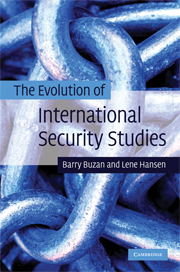Book contents
- Frontmatter
- Contents
- Foreword
- List of abbreviations
- List of figures
- List of tables
- Introduction
- 1 Defining International Security Studies
- 2 The key questions in International Security Studies: the state, politics and epistemology
- 3 The driving forces behind the evolution of International Security Studies
- 4 Strategic Studies, deterrence and the Cold War
- 5 The Cold War challenge to national security
- 6 International Security Studies post-Cold War: the traditionalists
- 7 Widening and deepening security
- 8 Responding to 9/11: a return to national security?
- 9 Conclusions
- References
- Author Index
- Subject Index
Foreword
Published online by Cambridge University Press: 05 June 2012
- Frontmatter
- Contents
- Foreword
- List of abbreviations
- List of figures
- List of tables
- Introduction
- 1 Defining International Security Studies
- 2 The key questions in International Security Studies: the state, politics and epistemology
- 3 The driving forces behind the evolution of International Security Studies
- 4 Strategic Studies, deterrence and the Cold War
- 5 The Cold War challenge to national security
- 6 International Security Studies post-Cold War: the traditionalists
- 7 Widening and deepening security
- 8 Responding to 9/11: a return to national security?
- 9 Conclusions
- References
- Author Index
- Subject Index
Summary
There is a long as well as a short story as to why we wrote this book. The short story begins in 2005 when Lucy Robinson at SAGE asked Barry Buzan whether he would be interested in editing a four-volume reader on International Security. Barry thought it a nice idea to add Lene Hansen to the project, thereby bringing in someone with both a different perspective and a closer eye on the Poststructuralist–Feminist–Critical scene. The discussions and readings that went into selecting the articles for that reader, spanning Wolfers and Kennan from the 1940s and 1950s to recent Post-colonial and Feminist analyses of the Global War on Terrorism, led us to believe there was a book to be done on the evolution of International Security Studies (ISS) as an academic field. In the process of re-reading, we were struck by Nye and Lynn-Jones's (1988) observation that the intellectual history of ISS was yet to be written, and even more struck by another twenty years of silence on the subject. A sceptical reader might of course think that this indicates the futility, impossibility or lack of audience for such a project, but we beg to differ. We think that an intellectual history, and an account of how different perspectives play into each other, evolve and battle, is a useful thing to have. Historical context is always good, and allows ISS to enter the pantheon of related academic enterprises like Political Theory, Political Science and International Relations (IR) that do have such self-understanding.
- Type
- Chapter
- Information
- The Evolution of International Security Studies , pp. ix - xiPublisher: Cambridge University PressPrint publication year: 2009

